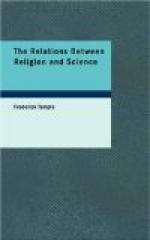This is the Faith which is perpetually presenting to the believer’s mind the vision of a world in which all the inequalities of this present world shall be redressed, in which truth, justice, and love shall visibly reign, in which temptations shall cease and sin shall cease also; in which the upward strivings of noble souls shall find their end, and holiness shall supersede penitence, and hearts shall be pure of all defilement. This is the Faith which holds to the sure conviction that all things shall one day come to judgment; and whether by sudden catastrophe or by sure development, the physical system shall surrender to the moral. This is the Faith which supplies perpetual strength to the hope of immortality; for though it cannot be said that the immortality of the individual soul is of necessity involved in a belief in the supremacy of the Moral Law, yet there is a sense, never without witness in the soul, that all would not be according to justice if a being to whom the Moral Law has been revealed from within is nevertheless in no degree to share in the final revelation of the superiority of that Moral Law over what is without. We cannot say that it is a necessary part of the supremacy of the Moral Law that every one of those who know it should partake of its immortal nature. We cannot even say that it is a necessary part of the ultimate redressing of all injustice and resolution of all the discords of life that the hope of it should prove true in the individual as it will certainly prove true in the universe. For we are unable to weigh individual merit or demerit, and cannot assert for certain that the balance of justice is not maintained even in this present life. But nevertheless the hope that it must and will be so is inextinguishable, and Faith in an Eternal Law of Morals is inextricably bound up with hope of immortality for the being that is endowed with a moral and responsible nature.
Faith in the absolute supremacy of the Moral Law is the first, but this again is not the last step upwards in Faith. We are called upon, and still by the same imperative voice within, to carry our Faith still further, and to believe something yet higher.




